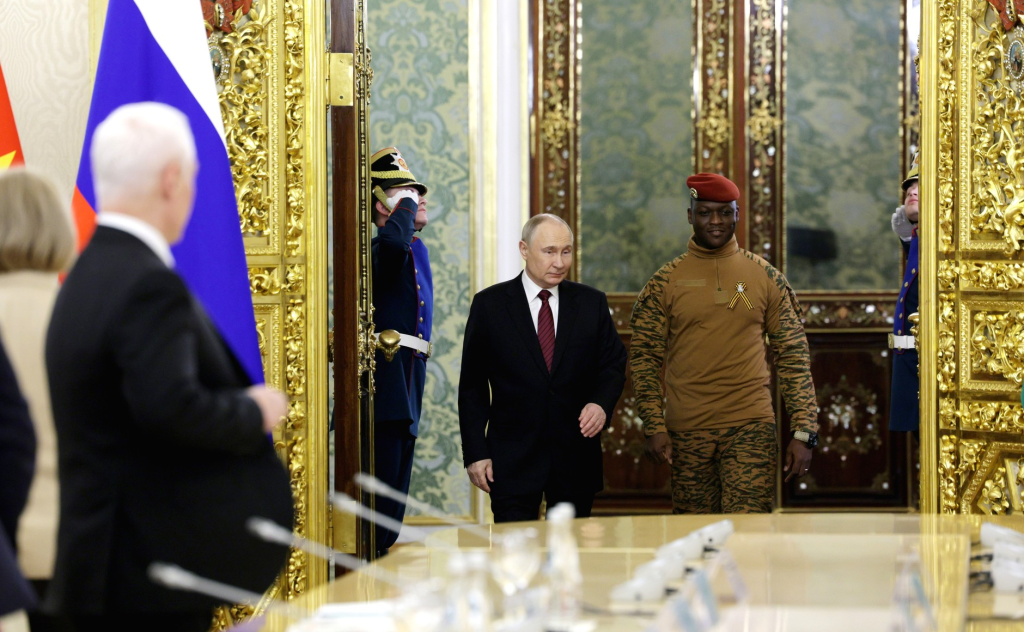No leader of any country has been assassinated more times than Captain Traoré. Literally, every day, a new video is uploaded on the Internet detailing another foiled assassination or coup attempt or larger-than-life story featuring him.
In one instance, a network of 165 Facebook accounts amplified a claim that Vladimir Putin sent special forces to protect Traore and generated over 10.9 million views in 10 days. In another instance, a YouTube video that featured him with celebrities like Beyoncé, Selena Gomez, Rihanna and R. Kelly alongside Traore, drew 1.8 million views.
Anyone who has tried know it’s impossible to argue with his supporters that these are fictional.
Captain Ibrahim Traore has become the online obsession of a generation of young Africans, with young Nigerians at the fore of this massive personality cult. According to the BBC, Nigerians lead the number of mentions of Traoré on X (formerly Twitter).
This is indeed a big deal. It suggests Nigerians’ thirst not only for bold leadership, but for new myths and new narratives to serve as an existential counterpoint to the crushing sense of stagnation that has gripped the country.
We explore what psychologists tell us about this phenomenon.
First, let’s establish the facts.

Establishing the Facts
Captain Ibrahim Traore, assumed power in Burkina Faso through a military coup in September 2022 that overthrew Lieutenant Colonel Paul-Henri Damiba. His leadership has been marked by a strong anti-imperialist and pan-Africanist stance that has positioned him as a symbol of resistance against Western influence, particularly France.
To avoid taking a cynical view, it must be noted that Traore’s leadership has yielded notable economic achievements, which form a realistic basis for his popularity. According to LN24 International, Burkina Faso’s GDP grew from approximately $18.8 billion to $22.1 billion under his tenure, at a growth rate of 3.7% in 2024. Agriculture, services and mining support this growth. Some of his achievements include:
Record Cereal Production: The Presidential Initiative for Agricultural Production led to nearly 6 million tonnes of cereal production in 2024.
Debt Clearance: Traore cleared a $4.7 billion external debt through smart money management, increased gold earnings and renegotiated trade deals.
Gold Mining Reforms: The nationalization of the gold mining industry has ensured state control, with profits now being redirected to vital sectors like farming, schools, hospitals and clean energy.
GDP Growth: Agriculture contributed 16.33% to Burkina Faso’s GDP in 2023.
Security: There have been improvements in Burkina Faso’s security, with schemes like special rapid intervention brigades though security challenges persist.

Captain Ibrahim Traoré In the African Imagination
While these accomplishments are significant, they alone do not fully explain the fervour surrounding him. In reality the generational obsession with Captain Ibrahim Traoré mirrors psychic events rather than actual ones.
To unpack this phenomenon, we can turn to the foundational work of Gustave Le Bon, author of The Crowd: A Study of the Popular Mind, and Sigmund Freud, particularly his study Group Psychology and the Analysis of the Ego. Both thinkers explored how individuals often surrender rational judgment when they become part of a crowd or a mass movement. In such settings, a charismatic figure can take on amplified importance. The figure takes takes on a heroic status not because of what they are, but because of what they come to represent in the collective imagination.
To the young African, Traore is such a focal point for the frustrations, dreams and identities of African youths. His youth, bold actions and anti-imperialist rhetoric position him as a larger-than-life figure that allows mythology to replace critical analysis.
This is where the concept of projection becomes key. Projection is a psychological process whereby individuals unconsciously attribute their internal desires, fears and ideals to an external figure. In the case of Traoré, many African youths bedevilled by economic challenges and perceived Western exploitation have projected their aspirations for liberation, economic justice and strong leadership onto Traore. His defiance of France, a former colonial power, serves as a symbolic victory that fosters a sense of collective empowerment and strength. There is also his oratorical ability to articulate this shared grievance and struggle. This has made him the rallying point for a generation seeking to reclaim African agency that he is today.
Traoré as A Psychic Event
Traoré’s rhetoric, actions and image all align with this psychic hunger. His anti-imperialist language, his defiance of France, his militarized posture against corruption and terrorism, and even his choice to retain his modest military salary all contribute to his symbolic potency. These function as signs in a myth-making system that point to a populace that is hungry for heroes.
Traore’s decision to forgo his presidential salary and stick to his modest military salary and nationalize resources, also contributes to his appeal. Such symbolic gestures signal selflessness and alignment with the poor masses, qualities that African youths crave in their leaders amidst widespread corruption. It creates an emotional connection that is amplified by the contrast between Traore’s austerity and the lavish lifestyles of many African leaders.
There is also his youthfulness. At 37, Traore’s youthfulness makes him uniquely relatable to Africa’s young population, with Nigeria’s median age around 18. For instance, the enthusiastic reception he received from Ghanaian youth reflects a broader desire for youthful leadership across the continent. Traore’s age and military background project vitality and action in contrast with older, often corrupt, political elites.
Social media algorithms supercharge these psychic events. When in the past, myths formed slowly over decades; now, thanks to digital technology, they can erupt and proliferate in days. The viral nature of the deepfakes and viral content featuring Traore with millions of views creates a feedback loop. The more content is shared, the more Traore’s image grows. This reinforces the collective belief in his revolutionary even Messianic status.

Captain Ibrahim Traoré In the Nigerian Imagination
The Nigerian Depression
To understand why Nigerian youth, more than any other demographic in Africa is leading the charge, one must first enter the emotional and psychological atmosphere of Nigeria today.
In his seminal work The Meaning of Anxiety, American psychologist Rollo May described depression as fundamentally “the inability to visualize a future.” In this sense, depression need not only afflict the individual, it can also bedevil societies, even civilizations. Yes, there are moments in a nation’s life when the people cease to believe in its tomorrow, when hope, no matter how quietly, detaches itself from the public imagination and flees. What remains is a shell of rituals: elections, speeches, national anthems, graduations, holidays, without meaning or galvanising power.
Nigeria today, in the eyes of its youth, has entered such a moment. And it is not a coincidence that in the heart of this existential paralysis, many young Nigerians have found themselves fascinated, even obsessed with Captain Ibrahim Traoré.
To state the facts:
- Nigeria’s GDP plummeted from $364 billion in May 2023 to $188 billion today, representing a massive 50% decline
- GDP per capita crashed from $1,640 to $835 in the same period, another 50% decline.
- Multidimensional poverty increased from 38.9% to 54%, affecting 129 million Nigerians
- 75% of rural Nigerians now live in poverty, according to World Bank reports
Social Infrastructure Collapse:
- 18.3 million Nigerian children are out of school, the highest number globally
- Less than 20% of Nigeria’s 30,000 Primary Healthcare Centers are functional
- Nigeria ranks as the world’s worst country for childbirth, with one death every seven minutes
- 7 million Small and Medium Enterprises shut down in two years
- Over 80 manufacturing companies permanently closed
- 15 major multinationals exited the country
- The cost of electricity has risen to ₦225 per kilowatt-hour, while blackouts remain the norm.
- Public debt is now estimated at over ₦188 trillion, yet no significant improvements have occurred in education, healthcare, or energy.
The Psychological Manifestation
- Nigeria ranks among the top three most stressed countries globally
- 59% of the population experiences daily stress
- Over 20 million Nigerians are affected by mental illness, according to WHO estimates
The Japa Generation and the Flight from Tomorrow
The phenomenon known as “Japa”, a Nigerian slang for “to flee”, has been the only way young Nigerians respond to the Nigerian Depression. Well, not until the rise of Captain Traore.
Between 2017/18 and 2021/22, the number of Nigerian students in the UK exploded from 10,685 to 44,195. This represents a staggering 314% increase that made Nigeria the third-largest source of international students to Britain, trailing only China and India.
According to a now world-famous stat by the African Polling Institute with support from the Ford Foundation, about 69% of Nigerians said they would relocate out of the country with their families if given the chance. In 2019, this same poll reported the stat to be just 39%. This mass exodus represents more than economic migration; it’s mostly psychological flight from Nigeria.
The Psychological Japa to Captain Traore
Rollo May’s definition of depression applies not just to individuals but to entire societies. When institutions fail systematically, when merit becomes meaningless, when hard work leads nowhere, a collective depression settles over a nation. The symptoms manifest everywhere: the cynicism of youth, the exodus of talent, the embrace of strongman fantasies and dreams of revolution.
The fascination with Traoré represents hope in exile for those who can’t flee to Western countries. It represents the psychic energy that should be invested in Nigeria’s future now redirected toward a foreign leader who promises competence, patriotism and courage to confront vested interests. In other words, young Nigerians aren’t truly obsessed with Burkina Faso’s captain; they’re mourning the leadership they lack at home.

The Traoré Mirage and the Aesthetics of Hope
There are dangers in romanticizing figures like Captain Ibrahim Traoré. His government has cracked down on free press. There have been allegations of repression, forced conscription and unreported civilian casualties. These are ugly features of military dictatorships that older Nigerians are well acquainted with. Those who call for the military to takeover in Nigeria in the hope of finding a Nigerian Captain Ibrahim Traoré are mostly those who are ignorant of the history of military regimes in Nigeria.
The Nigerian imagination has always been fertile ground for political myth-making. In the 1980s, Muhammadu Buhari himself once carried similar symbolic weight: a no-nonsense soldier with a promise to clean the Augean stables. And in 2014, the same symbolic weight drove many prominent Nigerians to support him. In both instances, he left Nigeria way worse. Even Abacha was mythologized in his own time but Nigeria never had it any worse.
The use of deepfakes, AI-generated propaganda and false hero worship online distorts ugly reality. But this is only a symptom of the broader Nigerian depression. In the absence of real dreams, people will believe in myths. When a nation fails to offer a narrative of collective purpose, its citizens will borrow one from elsewhere.
In other words, the youth of Nigeria do not seek perfection. They seek movement. In Captain Ibrahim Traoré, they perceive motion towards the future, however flawed. In Nigeria, they perceive stasis and decay, even backwardness.
There is only one way out of this psychic death-spiral: the reconstruction of national futurity. Nigeria must reimagine its purpose, its institutions and its contract with its people. This experiment need not be revolutionary. It might be piecemeal, even slow, but it should be tangible enough to produce the feeling that Nigeria has a future, a tomorrow, that is worth waiting for and looking forward to. This is the only way to dispel the darkness presently overhanging an entire generation of young Nigerians.
Otherwise, to allow the despair to fester risks transforming it into widespread violence that will make the current depression seem mild by comparison.












